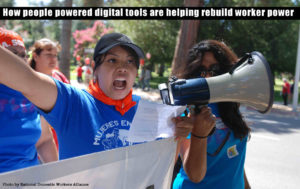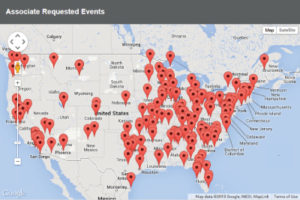So, lately we have been compiling and sharing stories of worker-led organizing in the social justice sector.
CB: Oh, when you come to Berlin, we need to talk about this! I’m part of a labor union in Berlin. We haven’t started organizing NGO workers yet, but that’s the dream. There’s definitely been an amount of disgruntled NGO workers in the mix.
Laughs. I love how you say disgruntled!
CB: Well, this is the only time that people go to unions, right. When they go, oh shit, everything’s going downhill. Not when they’re new and bright-eyed on the job. Anyway, I think this segment [of worker organizing in social justice organizations] is growing. It’s a worker segment that’s ripe for organizing.
For me, I see it’s more visible in the Global North. What do you think?
CB: Yeah, I guess so. There is some discussion. I just did research for guided compensation for young people. It’s really more about volunteerism [but on an international level]. It is an entirely different area for a young person in an organization. But maybe you wanted to talk more about unpaid internships.
Yes, I did! So when were you an intern and when did you begin to organize interns?
CB: I had been an intern in Canada before but it was more in this cooperative education kind of setting. It was through the university. They were always paid internships. It was a collaboration with the university, so there were very high learning outcomes and very strict standards, including payment. When I decided to do an internship after I graduated from my masters in Europe, I thought it would be interesting to do something at the UN. I just thought it would be the way to get in.
I applied for internships at the international criminal tribunals in The Hague. I did mine at the Special Tribunal for Lebanon. Some of the tribunals are different; some of them manage to provide stipends for their interns and others are entirely unpaid. When I was there, I was able to do an internship on a stipend that was 500 euros a month. Living in the Netherlands, it wasn’t much at all. I had to use my savings to cover my expenses. And then the stipend was only valid for 4 months, and they asked me to stay on for another 2-3 – so then I was living entirely on my savings. I had to put some of my rent on my credit card.
This is what I really remember from your tweet about that time! It’s just such a vivid experience and memory for a young person, to have to put a basic living expense on a credit card and then really struggle to pay it.
CB: Yeah, you’re like – oof, this better be worth it!
There were a lot of us that were interns. The courts really run off the back of interns. A lot of work in the courts like transcription, translation – the vast majority of the people doing that kind of work are interns and are unpaid. We were really disgruntled about it and then some people weren’t aware that we were unpaid and spurred us on to do things. A few of us then got together.
We had a couple of meetings about what we could do about it. We looked into things like – if we had rights in terms of payment. We founded the Hague Interns Association. It wasn’t unique at the time. The Geneva Interns Association existed already for quite some time. But we thought it would be good to have one in the Hague. This was after I graduated. This would have been 2011 or 2012, so it was about a decade ago. Unfortunately, it fizzled out. There were a lot of interns who were interested. But one problem was that they were super transient. The moment that they began to get interested and want to organize, they would leave.
They couldn’t afford to stay longer as well.
By nature, they were meant to be limited term. That’s just the nature of internships. And maybe in a way, it was also a good thing, because so many were unpaid.
First, we started with comms. We had people start with blog posts about their experiences. We wanted to activate some other interns to get involved. We did a couple of – I wouldn’t call it actions. But there are staff associations at the UN and they have websites and discussion boards. A bunch of us went in and wrote things on the comments board [about unpaid interns]. A lot of the responses were basically the agency abdicating responsibility for it. They would respond: The UN budget is set by the country and the member states, and they’re the ones that decide how we can spend money. That’s both true and false. It’s true that the administrative budget is set and that budget is controlled by the General Assembly. But there were examples of individual agencies which pay interns. The ILO (International Labour Organization) pays interns. For as long as I can remember, they have just elected to pay interns.
There are also other considerations beyond pay that affect interns. It seemed as if interns existed in this legal gray zone where we also did not have employment rights. In the UN, you’re in this diplomatic space. Where the national laws don’t apply. But interns were considered, like, non-employees. At least at the time 10 years ago, we didn’t have access to formal workplace mechanisms, like HR processes, complaint processes, etc.
For example, if there was sexual harassment at the workplace and you wanted to go through some internal mechanism, you had some standing as an employee. Even if the mechanism wasn’t great at addressing the problem, it still existed as some sort of channel. But as an intern, you didn’t even get access to these.
I know that the UN Secretary General Envoy on Youth – a Sri Lankan woman called Jayathama Wickramanayake – did have a short campaign against unpaid internships in the UN, a year or two ago. I know in her office she refuses to use unpaid interns.
Young people holding positions of power are walking the walk. It will be interesting to see. The Envoy on Youth has become the United Nations Youth Office, so an official UN office with more power. It will be interesting to see what kind of role they might play going forward.
As far as unpaid internships in the UN, in some ways, it seems like a very niche topic. Unpaid internships broadly are getting a lot of scrutiny. Maybe this goes for the social sector in general. It’s less of a thing riling people up – people don’t see it as a labor issue. People still think that all this work is just bleeding hearts.
Bleeding hearts! Yeah, people still think that people working at NGOs aren’t paid at all.
At least in my experience as an intern, I came from the Global North doing an internship in the Hague, I could still afford it. Most of the interns in the Hague came from very privileged backgrounds. They were the hardest to mobilize. Many interns were okay with not getting paid, because they could afford it. They would like for it to change, but they didn’t see it as a rights issue. That also made it challenging. That influenced how we tried to talk about it. So we tried to say, “Maybe you personally can work for free. But let’s think about all of the talented young people who would like to be here but who cannot afford it.”
I didn’t study youth studies or youth development – I hadn’t thought that I would end up in the youth sector. I was just an active young person. I didn’t know that this was an actual area of policy.
Well you made it into a thing! I can really see the beginning of your career now, from organizing young unpaid interns at the UN to working in youth policy as a researcher.
When I moved to Berlin, it was right on the heels of The Hague. That’s when I found out about Youth Policy Labs – at that time, I think it was just called Youth Policy. These are the things that I’d always been interested in, this intersection between young people doing things and this policy work. That’s how I kind of came to it. Now, I’m becoming more interested in young people organizing for their own economic and labor rights. It’s coming full circle. It’s so much about participation, but we don’t tend to think about our workplaces as our nucleuses for politics or participation. But a lot of young people’s first interaction with their rights is going to be in the workplace. If your boss doesn’t pay you, and your side job is selling pizza on the weekends, and you can’t pay your rent, then you’re going to have to think about it as a rights violation at some point. And that’s how we can start.




